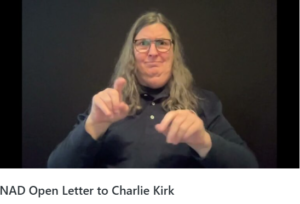Calling Up Justice defines calling up culture as being willing to acknowledge where harm or barrier exists and addressing them. Call down culture responds to real harm with denial and refuses to address inaccessibility. We believe in calling up access with our Deaf community.
In the midst of the devastating LA wildfires, a troubling wave of dehumanizing rhetoric has emerged from conservative politicians and media figures, who have used this crisis as an opportunity to scapegoat marginalized communities and liberal policies. Their attacks have targeted the lesbian Fire Chief of Los Angeles, the city’s Black female mayor, diversity, equity, and inclusion (DEI) training, and even past environmental policies addressing endangered species. Among these divisive narratives was the baseless criticism of American Sign Language (ASL) interpretation during emergency briefings, dismissed by some as a “distraction” to able-bodied audiences. Lisa M. Rose, President of the National Association of the Deaf Board of Directors, responded directly to these harmful comments, particularly those made by Charlie Kirk, emphasizing the critical importance of accessibility for the deaf and hard-of-hearing community during emergencies and addressing widespread misconceptions about ASL interpreters’ role in saving lives.
Background: In one of his podcasts, internet personality Charlie Kirk stated:
(You can see the original video clip here:)
https://www.mediamatters.org/media/4026530/embed/embed
Transcript:
CHARLIE KIRK (HOST): I’m gonna say this just off the cuff before I introduce our guest. Can we please just go away with half the screen during these emergency briefings to the sign language interpreters? I have nothing against, obviously, people that cannot hear, but there’s closed captioning. I mean, this is just over the top. We can’t do this. We gotta get back to how it used to be. It’s just, oh, it’s just too much. It’s a distraction is what it is. The reason is they do these emergency briefings for fires or terrorist attacks, and you’re looking at this and you’re not listening. I don’t like it. So we got — we just gotta — closed captioning’s perfectly fine. I think we have to — we gotta get back to basics here.
In response, the National Association of the Deaf Board shared this message with the community:
Dear Mr. Kirk,
We at the National Association of the Deaf (NAD) are writing in response to your recent comments regarding sign language interpreters during emergency briefings. While we respect your right to share your views, we feel compelled to address several misconceptions in your statement about accessibility for the deaf and hard-of-hearing community.
Your suggestion that closed captioning alone is sufficient overlooks critical aspects of deaf communication and accessibility.
First, American Sign Language (ASL) is a distinct language from English, with its own grammar, syntax, and cultural context. Many deaf individuals use ASL as their primary language and may have limited English proficiency. Reading and trying to understand closed captions in English during time-sensitive emergency situations can be challenging and potentially dangerous for these deaf community members.
Second, sign language interpreters provide crucial visual context, emotional nuance, and cultural mediation that captions alone cannot convey. This real-time interpretation can be life-saving during emergencies, when clear and immediate understanding is vital.
To understand our perspective, consider this: imagine watching an emergency broadcast with the audio completely muted, relying solely on closed captioning while an ASL interpreter signs the message. As a hearing person, you might find yourself struggling to follow along while feeling that significant context is missing from your usual way of receiving information. This is similar to what deaf individuals experience when they have access only to closed captioning without ASL interpretation. Just as you rely on audio for complete understanding, many deaf individuals rely on ASL for full comprehension.
Third, your characterization of interpreters as “distracting” fails to recognize that their presence is not a matter of preference but of essential access. Just as emergency broadcasts provide audio for hearing viewers, ASL interpretation ensures equal access to critical information for deaf and hard-of-hearing viewers.
The Americans with Disabilities Act (ADA) mandates equal access to public services and information. Sign language interpreters during emergency briefings are not “over the top” but rather represent the bare minimum of inclusive emergency communication.
We invite you to learn more about our community and why sign language interpretation is crucial. The NAD would welcome the opportunity to engage with you in a constructive dialogue about how emergency communications can best serve all Americans, including the estimated 48 million deaf and hard-of-hearing individuals in our country.
Accessibility is not a distraction—it is an essential human right and a critical matter of public safety. Language rights are not optional; they are fundamental to the dignity and equality of all people. Denying access is not just a technical or logistical failure, it is a violation of human rights. Language rights are human rights.
Sincerely,
Lisa M. Rose, President
The National Association of the Deaf Board of Directors
cc: Deaf and hard of hearing communities across the United States of America

